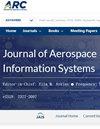不同载荷条件下无人机剩余飞行时间预测
IF 1.5
4区 工程技术
Q2 ENGINEERING, AEROSPACE
引用次数: 0
摘要
预计无人机将在军事和民用领域得到广泛应用。剩余飞行时间是保证电动无人机飞行安全的关键参数。然而,准确预测不同载荷条件下的剩余飞行时间需要大量的数据,并且在线应用的计算成本很高。为了解决这些问题,研究人员开发了一种基于时间卷积网络和迁移学习的深度学习方法,用于电动无人机的锂离子电池系统。利用时序卷积网络从监测数据中提取特征,预测某一载荷条件下航班的剩余飞行时间。然后使用一种层传递策略将学习到的知识从一种负载条件转移到另一种负载条件。利用固定翼e-UAV的电池健康监测数据验证了所提方法的有效性。实验结果表明,采用迁移学习策略的时间卷积网络比不采用迁移学习的时间卷积网络更有效、准确地预测了两种载荷条件下电子无人机的剩余飞行时间。本文章由计算机程序翻译,如有差异,请以英文原文为准。
Remaining Flying Time Prediction of Unmanned Aerial Vehicles Under Different Load Conditions
Unmanned aerial vehicles (UAVs) are forecast to be widely used in the military and civilian domains. The remaining flying time is a critical parameter to monitor during a flight to ensure the safety of electric UAVs (e-UAVs). However, accurate remaining flying time prediction under different load conditions requires a large amount of data and is computationally expensive for online applications. To address these issues, a deep learning approach based on temporal convolutional networks and transfer learning is developed for lithium-ion battery systems for e-UAVs. A temporal convolutional network is used to extract features from monitoring data and predict the remaining flying time of flights under one load condition. A layer transfer strategy is then used to transfer the knowledge learned from one load condition to another load condition. Battery health monitoring data collected from a fixed-wing e-UAV are used to demonstrate the effectiveness of the proposed method. Experimental results show that the proposed temporal convolutional network with the transfer learning strategy can predict the remaining flying time of the e-UAV under two load conditions more efficiently and accurately than a temporal convolutional network without transfer learning.
求助全文
通过发布文献求助,成功后即可免费获取论文全文。
去求助
来源期刊

Journal of Aerospace Information Systems
ENGINEERING, AEROSPACE-
CiteScore
3.70
自引率
13.30%
发文量
58
审稿时长
>12 weeks
期刊介绍:
This Journal is devoted to the dissemination of original archival research papers describing new theoretical developments, novel applications, and case studies regarding advances in aerospace computing, information, and networks and communication systems that address aerospace-specific issues. Issues related to signal processing, electromagnetics, antenna theory, and the basic networking hardware transmission technologies of a network are not within the scope of this journal. Topics include aerospace systems and software engineering; verification and validation of embedded systems; the field known as ‘big data,’ data analytics, machine learning, and knowledge management for aerospace systems; human-automation interaction and systems health management for aerospace systems. Applications of autonomous systems, systems engineering principles, and safety and mission assurance are of particular interest. The Journal also features Technical Notes that discuss particular technical innovations or applications in the topics described above. Papers are also sought that rigorously review the results of recent research developments. In addition to original research papers and reviews, the journal publishes articles that review books, conferences, social media, and new educational modes applicable to the scope of the Journal.
 求助内容:
求助内容: 应助结果提醒方式:
应助结果提醒方式:


